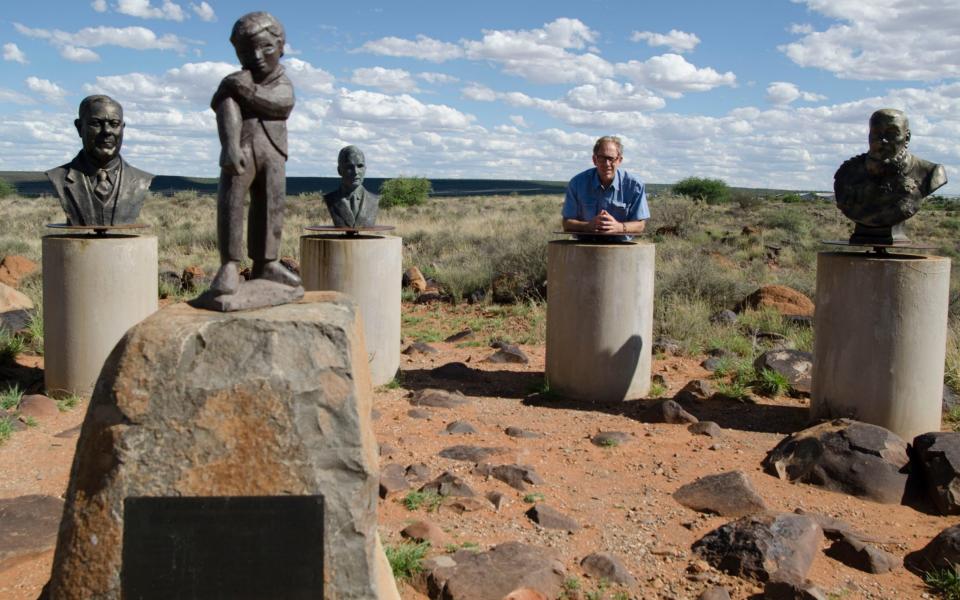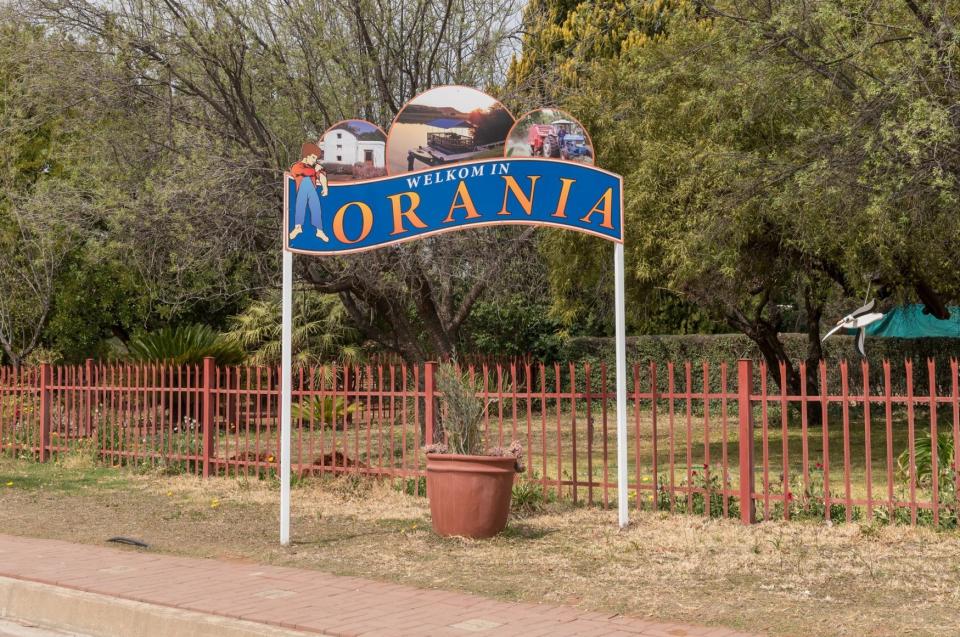Ade Adepitan: ‘I went to the whitest place on Earth – and saw a global shift to the far-Right’

- Oops!Something went wrong.Please try again later.
Of all the strange places I’ve visited in two decades of presenting travel documentaries, there’s no doubt that Orania, South Africa, was the most bizarre and unsettling. As a black man with a disability, as far back as I can remember wherever I’ve travelled, I’ve always been in the minority. It’s something I’ve got used to; these days when I arrive at a new destination I barely notice the awkward stares.
The all-white community of Orania felt different; for the first time in many years I felt uneasy about being literally the only black man in town.
Created in 1991, a year after Nelson Mandela’s release from Robben Island, Orania’s community (which now numbers around 3,000 white Afrikaners) was established by Carel Boshoff, the son-in-law of the former prime minister, Hendrik Verwoerd, often dubbed the “architect of apartheid”, and is currently run by his descendants.

Some of my initial anxiety probably derived from this historical context. South Africa is a country with deep wounds created by a brutal regime based on division. Given that April of this year marks the 30th anniversary of the end of apartheid, my unease was outweighed by my curiosity to understand why this group of Afrikaners wanted to once again live in a monoculture, segregated from black South Africans.
Orania has its own currency – the “ora”. Anyone wishing to settle in the town must prove their Afrikaner credentials and commit to a conservative, Christian lifestyle that includes the prohibition of unmarried couples living together. Although the Oranians deny all accusations of racism, they told me they believe that monoculturalism is a “healthier” way to live. One older man that I met (the partner of one of our contributors) told me: “I like your people. But you have to admit you feel better among your own.”
Because of their beliefs, I was surprised they consented to be interviewed by a black journalist. In truth, I think being a wheelchair user, and also not someone that was well known, made their PR team feel confident they could control the narrative – they thought I would be less willing to confront their ideology head on. They certainly didn’t expect me to be as spiky as I was, but also seemed to think they could convince me they were on the right track.

It’s obvious I don’t believe in racial segregation. I’m married to a white woman [the Scottish singer Elle Exxe] after all. We have a three-year-old son. I believe racism is a manufactured construct. There is only one race. Back in 2000, the Human Genome Project revealed skin colour plays little or no part in determining differences in humans. There is more genetic difference between a flock of penguins than there is between some of the Oranians I interviewed and me. But many of the Afrikaners I met in South Africa are a minority group raised with the idea that they were genetically superior and the indigenous black people were inferior. It’s a narrative that helped justify the historic theft of the land.
However, I can also see that 21st century South Africans have some justification for seeing the world this way, because the current ANC government has been accused of corruption and is running the country into the ground. Nelson Mandela would be turning in his grave. I find it incredibly frustrating that the ANC has given racists an excuse to say: “When we ran the country, things were more organised.”

I genuinely had some sympathy for some of the white working-class guys coming in to do all the construction work. They’re being exploited. Like all tightly knit groups, Oranians maintain a strict hierarchy, driven by money and power and maintained seemingly by brainwashing. These construction workers are at the bottom of the pile, so they get drunk frequently because their life is so hard. They’re the new blacks.
Learning more about South Africa’s violent history, I also came to understand that it isn’t only the oppressed who are traumatised by systems like apartheid. Such systems traumatise the oppressors, too. Doing that much horrible stuff affects you. White South Africans had so much power – they’ve felt so safe and superior – and it must be difficult watching that power slowly drain away. No wonder they’ve created this weird little “Disneyland for Afrikaners” where they can pretend none of it happened.
But while casual observers might think Orania is just a weird, irrelevant community, I think it’s actually part of a scarier global shift to the far Right.

In my view these people are aiming to create their own state. They’ve got weapons. I hope viewers of my documentary find themselves asking where the money is coming from. Because I’ve travelled all around Orania and I’ve seen that they have hardly any industry. They have no manufacturing base. They’ve got this tiny population in the middle of the desert and yet it’s able to sustain itself. You can’t tell me a few pecan farms are funding that town.
This was one of the most difficult films I’ve ever made. The subconscious barriers created by the Oranian monoculture made even the wide open spaces of the town feel claustrophobic. Orania should be a warning to all of us. Trump and Le Pen-style leaders all over the world will be watching closely, using it as a test case to prove monoculture is the way. I mean, Suella Braverman – the daughter of Indian immigrants married to a Jewish man – has also been saying that multiculturalism has failed, which seems crazy. But we have to accept it’s obviously a seductive idea for some people who feel afraid.
I was very relieved to get out of Orania. Being there wasn’t good for my mental health. I could talk quite easily to some of these people, even laugh off their views. But I fear if we continue to take for granted what humans have done for millennia – bringing different cultures together to create stronger and more harmonious societies – more Oranias could start to appear all over the world. This would be a huge move backwards for all of us.
Whites Only: Ade’s Extremist Adventure is on Channel 4, 18 March at 10pm

